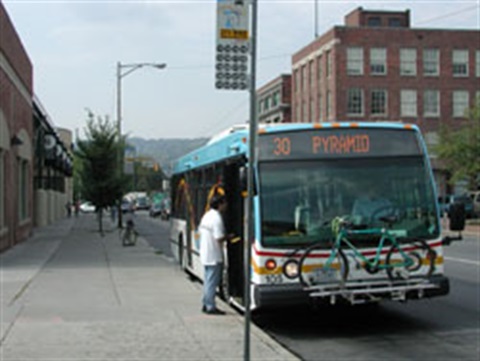County Transportation Providers and Planners Address High Gas Prices
Published on March 09, 2022

With the cost of gasoline surpassing $4.00 per gallon, many people are starting to think about ways to reduce their gas bills. People who live a short distance from their work may not be as impacted, but all the other trips like shopping, school, etc. also add to driving miles and thus to the cost of transportation. For those who have longer commutes, increased gas prices can have a significant impact in their household budgets.
What options exist? The answer to this question is complicated because every single person has different transportation needs. For many years now, transportation professionals in Tompkins County have been developing a transportation system that provides real options for community members from all walks of life to be less car dependent. Everything from multiuse trails and improved bus service to local carsharing have been developed and implemented to allow car free or ‘car light’ living.
Way2Go, a program of Cornell Cooperative Extension Tompkins County, was created to help educate everyone about the transportation options available to them. Visit their website - Way2Go.org - to learn about your options and to get tips on how best to move around ‘car light’. Way2Go and 2-1-1 work together to bring transportation information to all who need it. Call 2-1-1 Tompkins-Cortland for friendly, personal assistance troubleshooting your transportation needs.
The GO ITHACA program offers a wealth of information and incentives to help people try the range of alternative modes of transportation available in Ithaca. Incentives for those who live, work and shop in Ithaca include free bus passes, credits for Ithaca Carshare and even a $50 coupon for walking and biking gear. Check out their website at GOIthaca.org .
Replacing the car can seem daunting, but it can also be immensely rewarding when one starts to save money and realize a healthier lifestyle. It is understood that cars will always play a role in transportation regardless of where people live-rural, urban or suburban. But just eliminating one or two car trips a week can have a significant impact. This is not an all or nothing idea.
There are many examples of how to reduce car use. Residents of the Ithaca urban area can consider walking, cycling or using TCAT for some of their trips.
TCAT’s fares remain affordable at $1.50 per single adult ride and half fare for seniors, youth and persons with disabilities. Better yet, riders enjoy significant savings if they buy multi-ride or day-based passes with unlimited rides. Consider: On a single trip to anywhere in TCAT’s many-mile service area, an adult rider with a 15-ride pass pays less than a third of gallon of gas, or $1.33 at the farebox. With an annual pass, a rider could travel as many times or anywhere in TCAT’s service area for what amounts to $1.25 per day.
TCAT, which has trip planning tools and real-time apps, has 28 routes that cover much of Tompkins County and operate seven days a week, 360 days a year – tcatbus.com.
Bicycling may be an option to those who live close to their destinations. Consider riding some of our community multiuse trails. Or combine bike and bus use to get to and from your destination as TCAT has bike racks on all of its buses. Electric bikes can make it easier to cycle for longer trips and/or trips that involve hills. Overall, bicycling is a fun way to combine errands with exercise, saving both time and money.
The Ithaca Carshare program is a terrific community resource-ithacacarshare.org. Cars can be reserved to run a quick errand as needed. In combination with carpooling or transit, if may give the flexibility needed to leave the car at home.
For long distance commuters, visit fingerlakesrideshare.org to help connect to carpooling – drivers are needed!
Even when there is no alternative to driving, motorists can save gas by making sure their cars are tuned up, tires are properly inflated, that they are not carrying extra weight (time to empty the trunk) and by driving slow, steady and safely. Planning your trips can also help reduce driving. Try completing multiple errands in one trip. Fewer miles driven means less gas used.
When it is time to replace a car, consider shifting to an electric vehicle. Better yet, consider living car free using the many options in our community, and save yourself a bunch of money.
Explore how your household can live ‘car light’. Save money, live healthier and help the environment all at once – win, win, win.